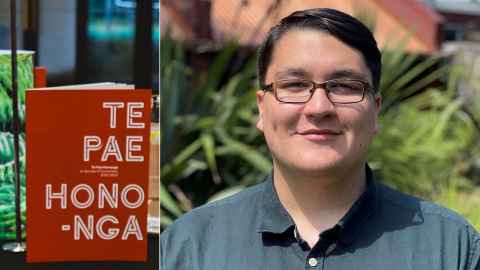Connection at the heart of law student’s work to empower Māori
30 November 2023
With a focus on “connecting the disconnected”, fourth-year student Caleb Brothers is working to empower iwi and hapū and improve outcomes for Māori.

Caleb is currently completing a Bachelor of Laws/Bachelor of Arts conjoint degree, with a double major in Māori Studies and Employment Relations and Organisation Studies.
He is also the 2023 recipient of the Chapman Tripp Iwi Governance Scholarship in Law.
“Something I am passionate about is iwi and hapū being able to continue to develop themselves economically so they can have more independence and provide for the needs of their people,” says Caleb.
By placing connection at the heart of all he does, Caleb is striving to ensure that “Māori have the opportunity to be connected to their whenua, their history and their language – and all of the benefits that come from that in terms of well-being and social cohesion”.
In 2022, Caleb took up the opportunity of a rangatahi internship under the mantle of the National Iwi Chairs Forum (NICF). NICF is a mandated group of 70 iwi who work collaboratively on key national priorities to improve outcomes for iwi Māori. Caleb's internship focused on digital inclusion and improving outcomes for whānau. This included working on Te Pae Hononga, a digital inclusion initiative that is connecting people with Te Kei o Te Waka Tainui, a charitable trust supporting descendants of the Waikato iwi based in south Auckland. Caleb’s role supports the delivery of this digital equity initiative in partnership with One NZ, assisting whānau to get connected and learn key digital skills through the journey of whakapapa connection.
“We've connected with whānau who live in south Auckland but might not always know much about their iwi, their hapū or their history, and who are digitally excluded as well,” he says.
Based on a concept of ‘four Cs’ – connection, capacity, capability and culture – the initiative provides internet connection, brand-new devices for participants and teaches them key digital skills, through a te ao Māori pedagogy delivered on marae in south Auckland with visits to historical sites of significance.
And while Caleb isn’t yet sure exactly what career he will pursue after graduating, he’s in no doubt as to the usefulness of his law background.
“Law affects every part of our lives, and so I think lawyers have a really important role in being able to clear the path and help us understand where those levers of change are,” he says.
“A lawyer's role is to understand the system that we operate in, how we can use it to our advantage and how it needs to be changed to get the best outcomes.”
Caleb says receiving the Chapman Tripp Iwi Governance Scholarship in Law has been an “invaluable taonga” on his journey. And while the financial assistance the scholarship offers has been appreciated, another benefit, he says, is that it opened his eyes to the work that commercial law firms like Chapman Tripp do to advance Māori interests.
“Hearing about the scholarship led me to look at some of the work that Chapman Tripp does and the role that Māori lawyers can play in helping iwi, hapū and Māori organisations,” he says. “I think that was something I hadn't really considered before, in terms of commercial firms being able to play a part in improving those outcomes.”
This year, the Chapman Tripp Iwi Governance Scholarship in Law celebrates its tenth anniversary, with more than a dozen scholarships awarded since it was established.
Media contact
Helen Borne | Communications and Marketing Manager
Alumni Relations and Development
Email: h.borne@auckland.ac.nz